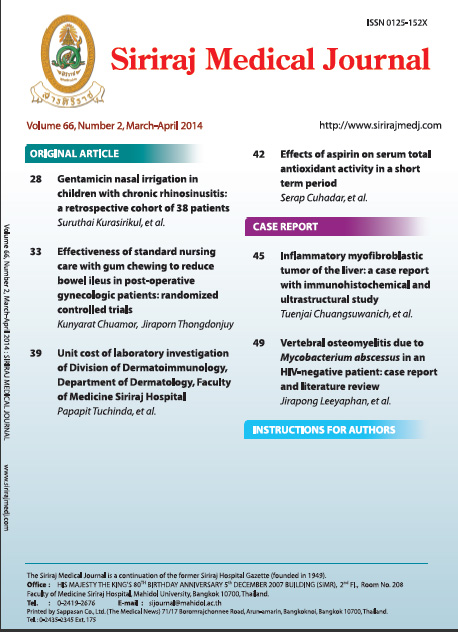Vertebral Osteomyelitis Due to Mycobacterium abscessus in an HIV-Negative Patient: Case Report and Literature Review
Abstract
Atypical mycobacteria are an extremely rare cause of vertebral infection. Review of the English literature by use of MEDLINE from 1955 to 2012 revealed less than 50 cases of vertebral osteomyelitis due to atypical mycobacteria. Three of these cases were due to Mycobacterium abscessus. Infection of the musculoskeletal system with atypical mycobacterium usually involves tenosynovitis and occurs from either percutaneous inoculation or hematogenous spreading. The clinical course is indolent, slowly progressive, and destructive. Most cases were immunocompetent hosts. This presented case de- monstrated vertebral osteomyelitis due to M. abscessus in an HIV-negative patient without history of any underlying diseases or trauma before having this infection. There are no consensus guidelines for the treatment of these infections. Treatment of these infections is difficult and requires a prolonged course of combination antimicrobial agents. Antimycobacterial treatments for infection due to M. abscessus are based on case series, in vitro susceptibility testing and the clinical experience of experts in patients with pulmonary diseases. Surgery is generally indicated with extensive cutaneous diseases, abscess formation or where drug therapy is difficult.
Keywords: Vertebral osteomyeltis, Mycobacterium abscessus
Siriraj Med J 2014;66:49-52
Downloads
Published
How to Cite
Issue
Section
License
Authors who publish with this journal agree to the following conditions:
Copyright Transfer
In submitting a manuscript, the authors acknowledge that the work will become the copyrighted property of Siriraj Medical Journal upon publication.
License
Articles are licensed under a Creative Commons Attribution-NonCommercial-NoDerivatives 4.0 International License (CC BY-NC-ND 4.0). This license allows for the sharing of the work for non-commercial purposes with proper attribution to the authors and the journal. However, it does not permit modifications or the creation of derivative works.
Sharing and Access
Authors are encouraged to share their article on their personal or institutional websites and through other non-commercial platforms. Doing so can increase readership and citations.










